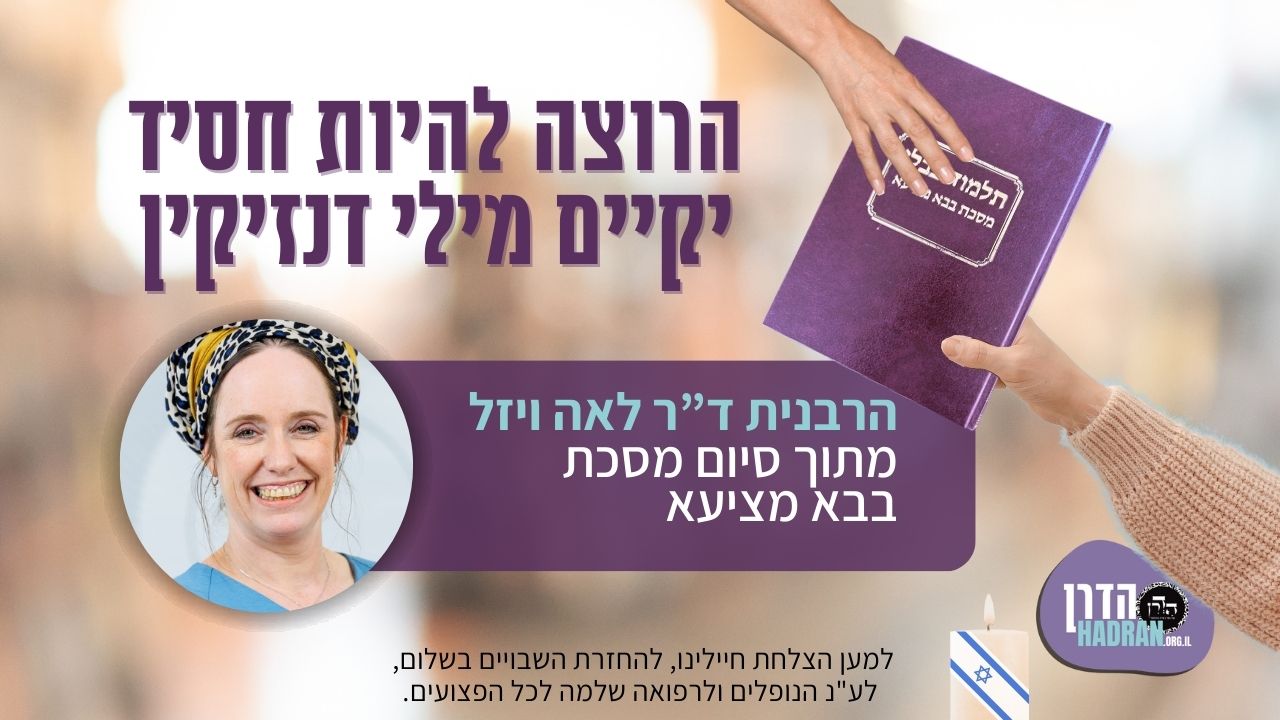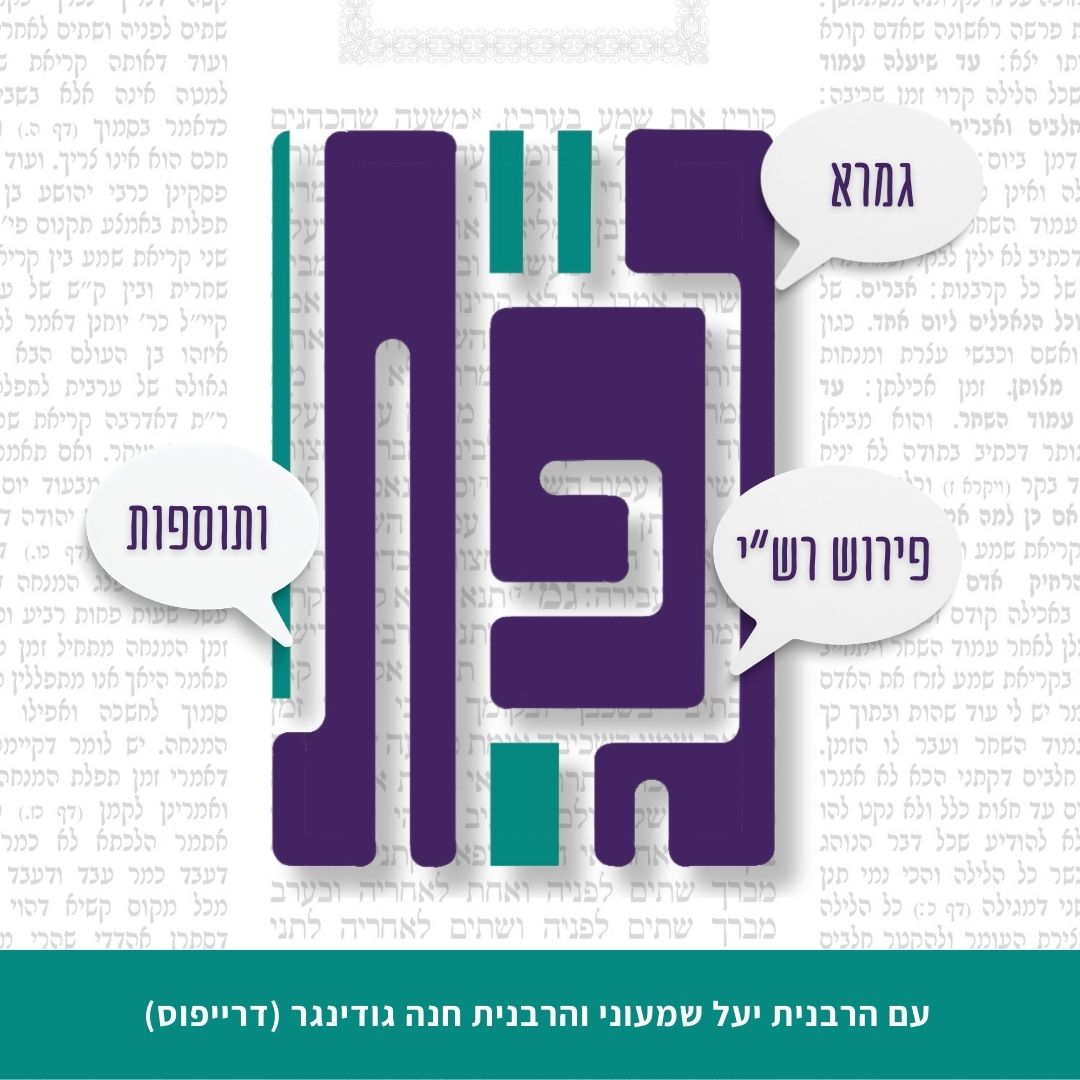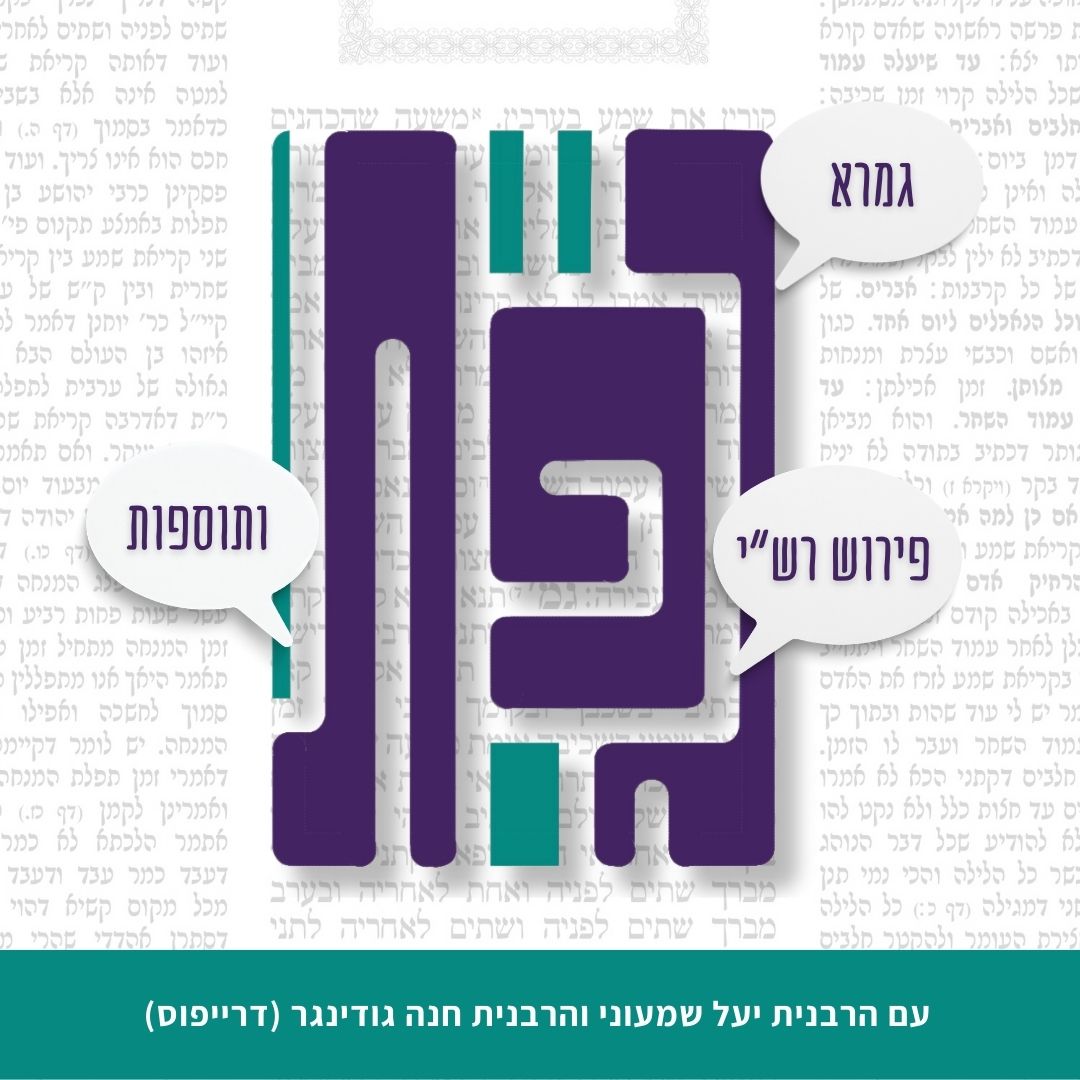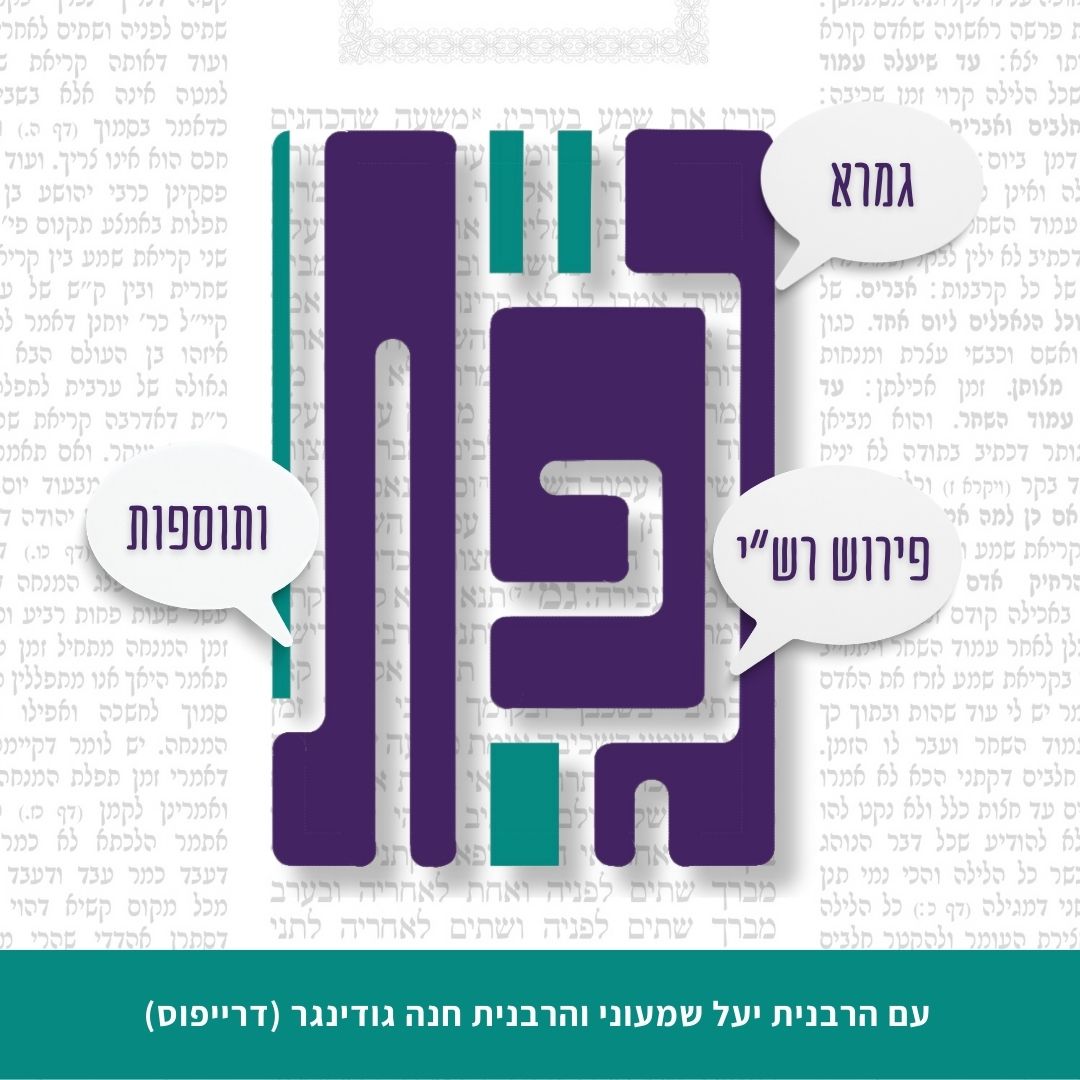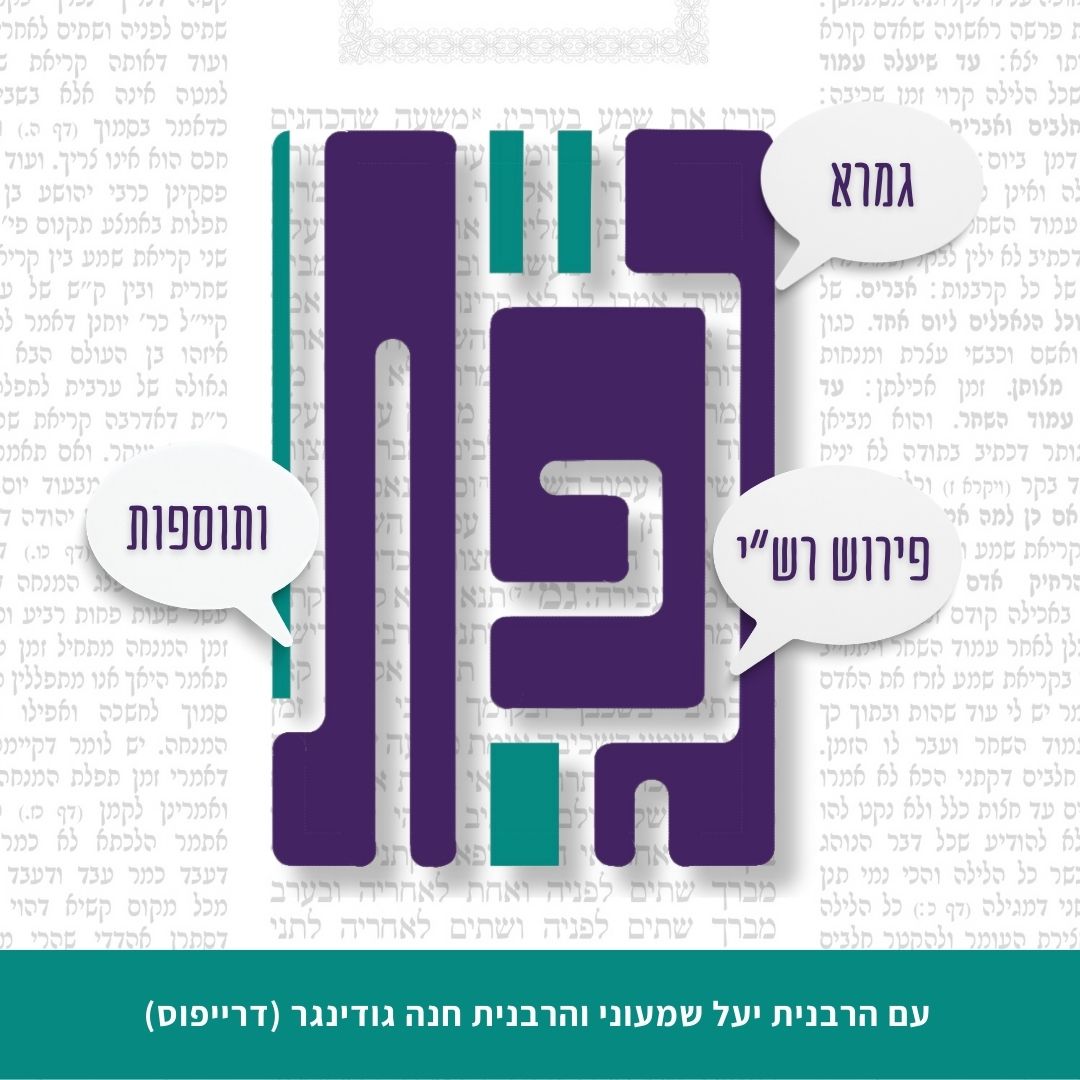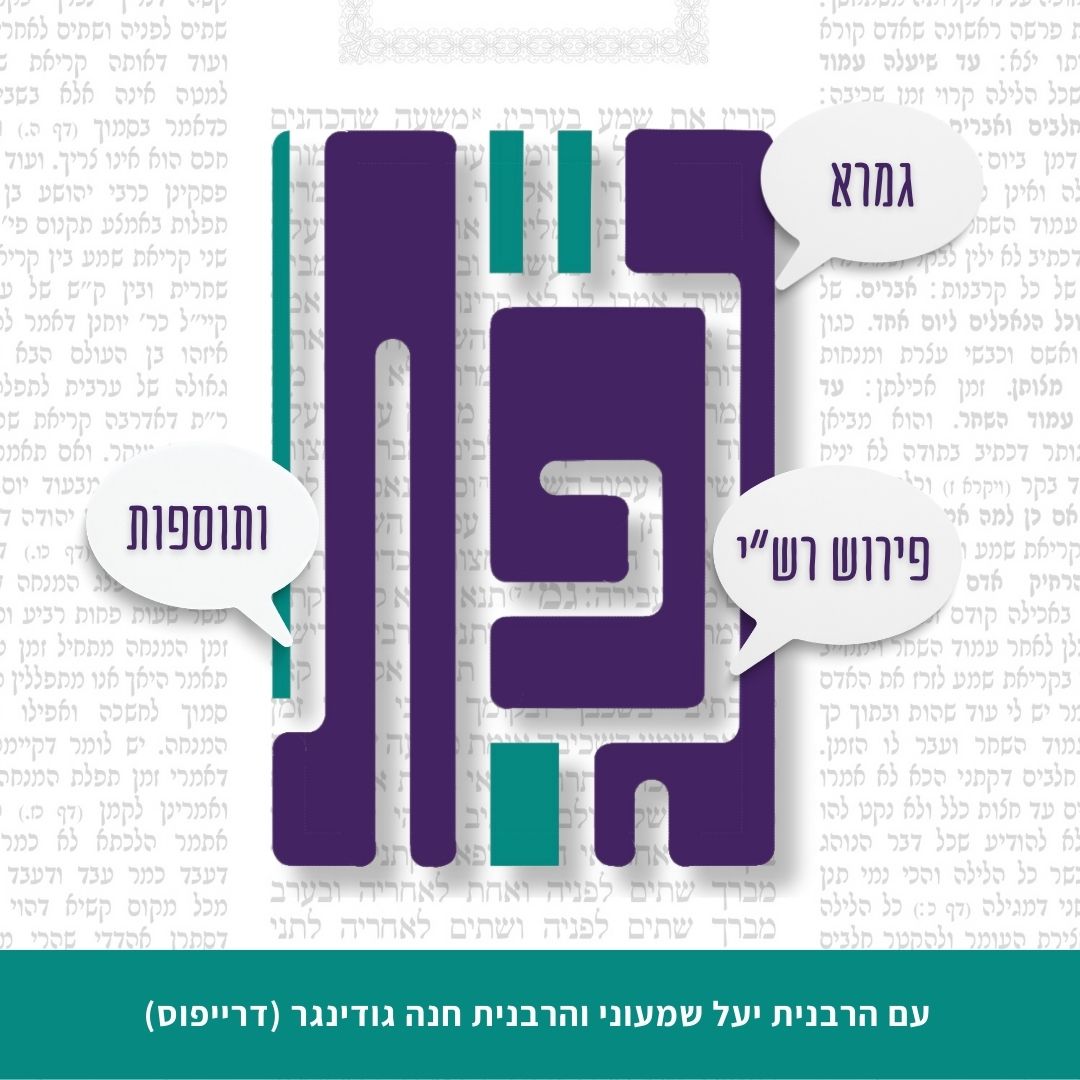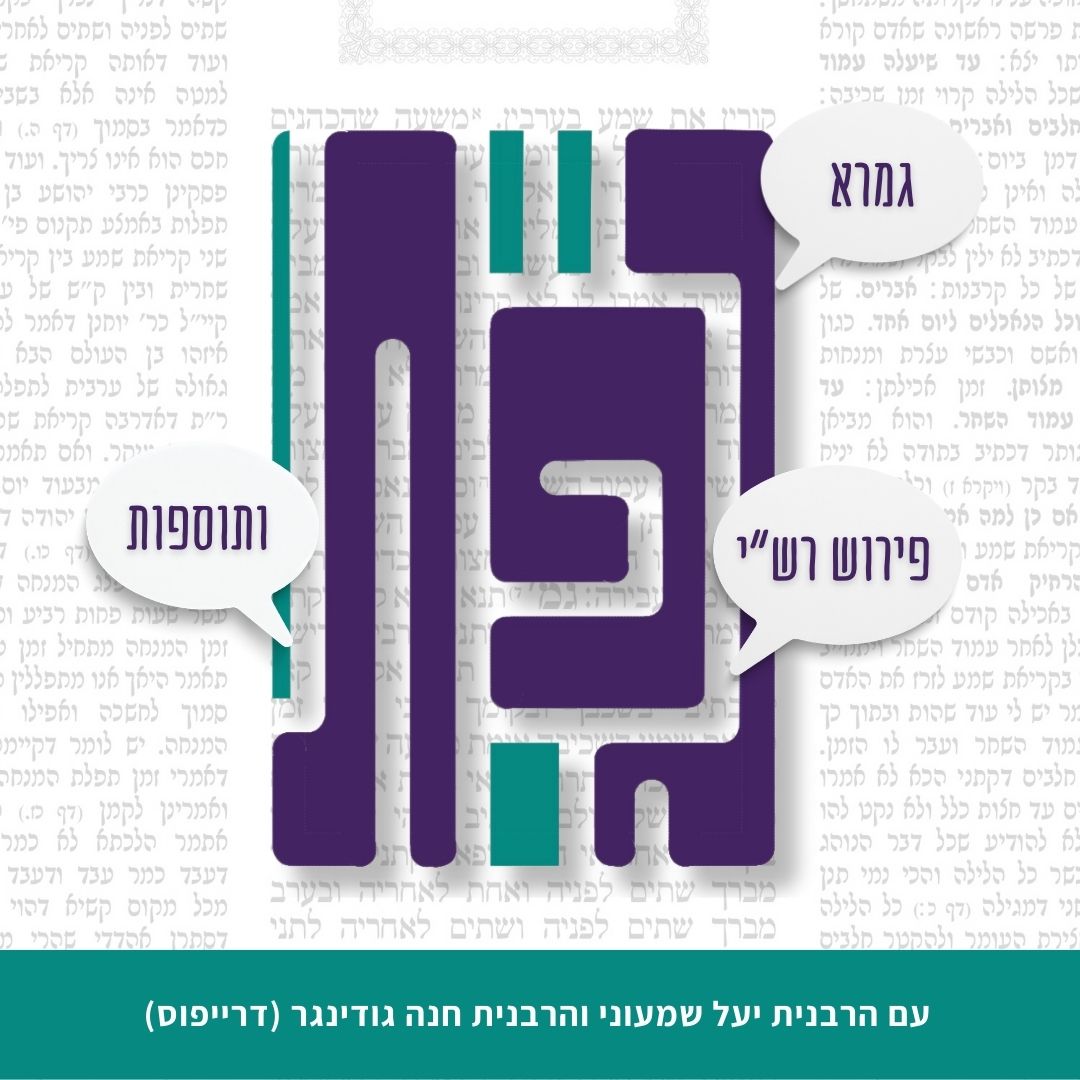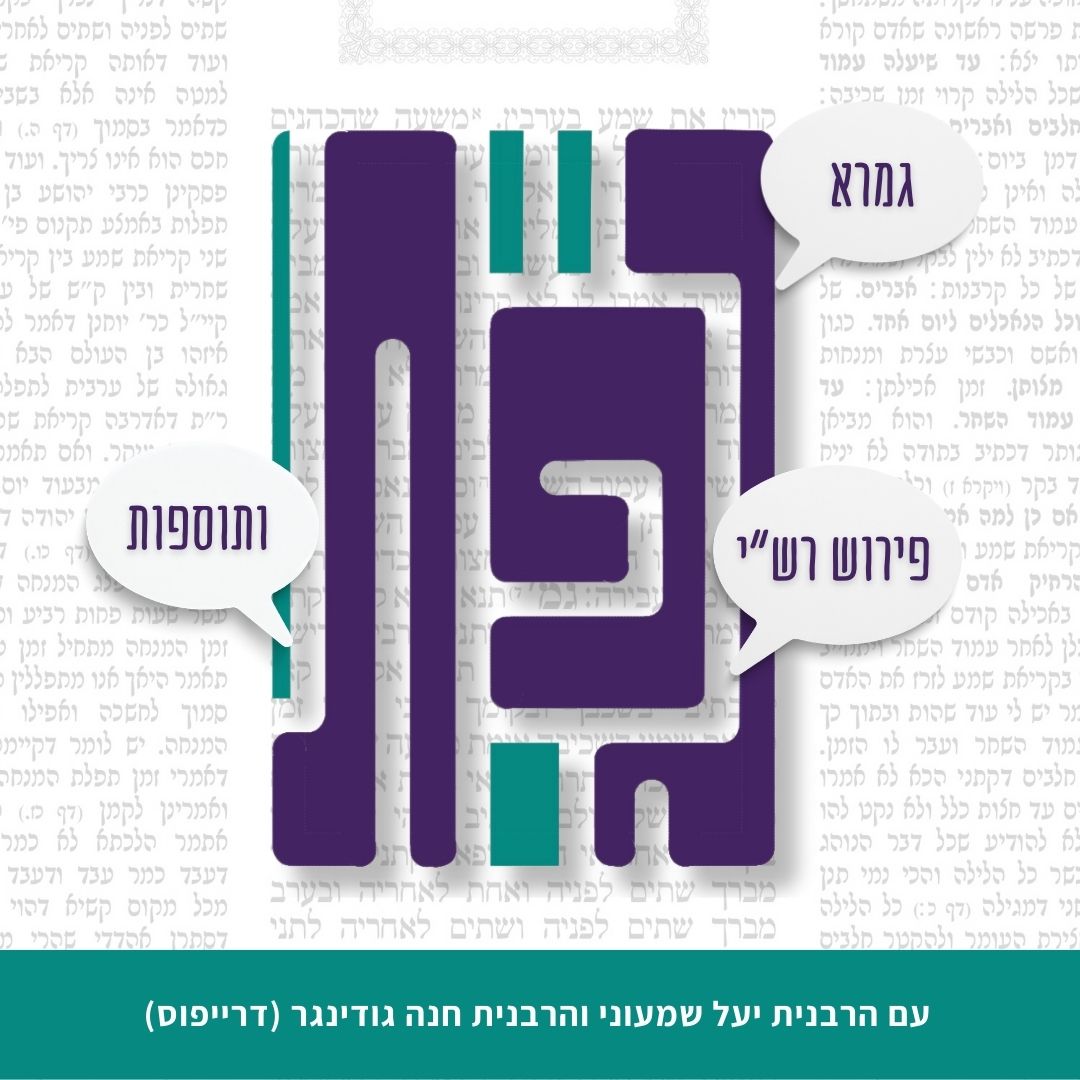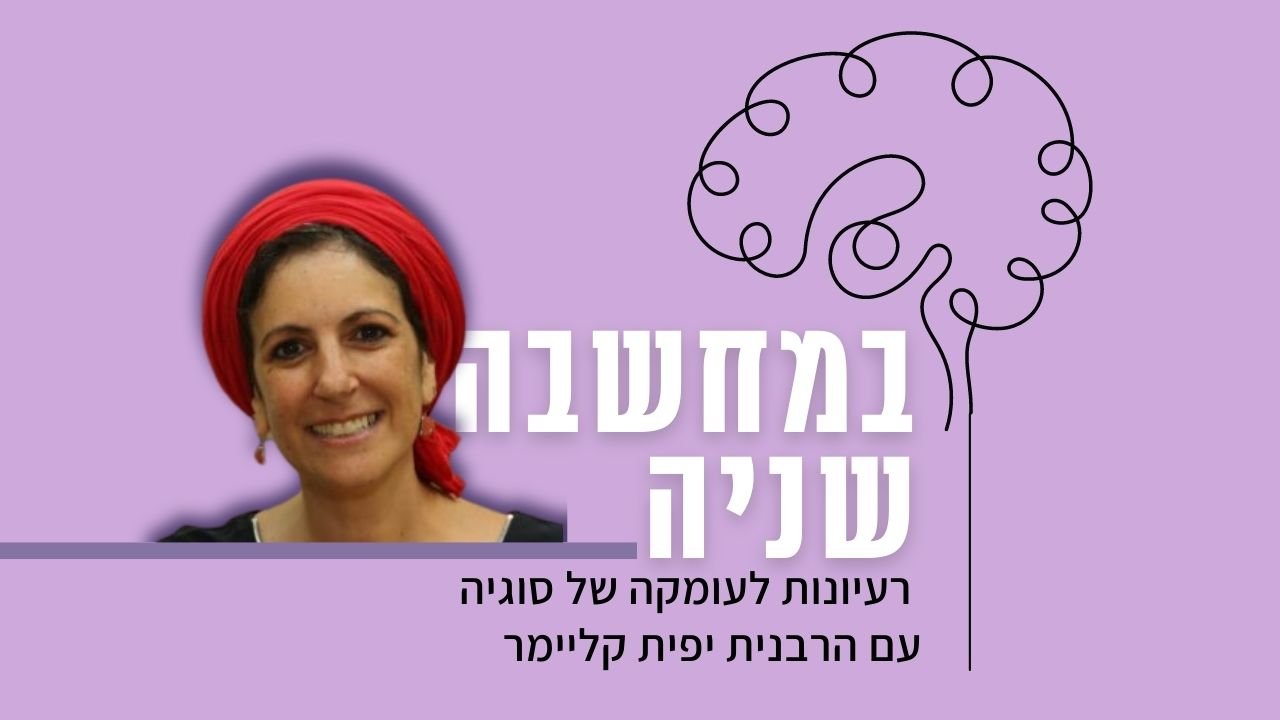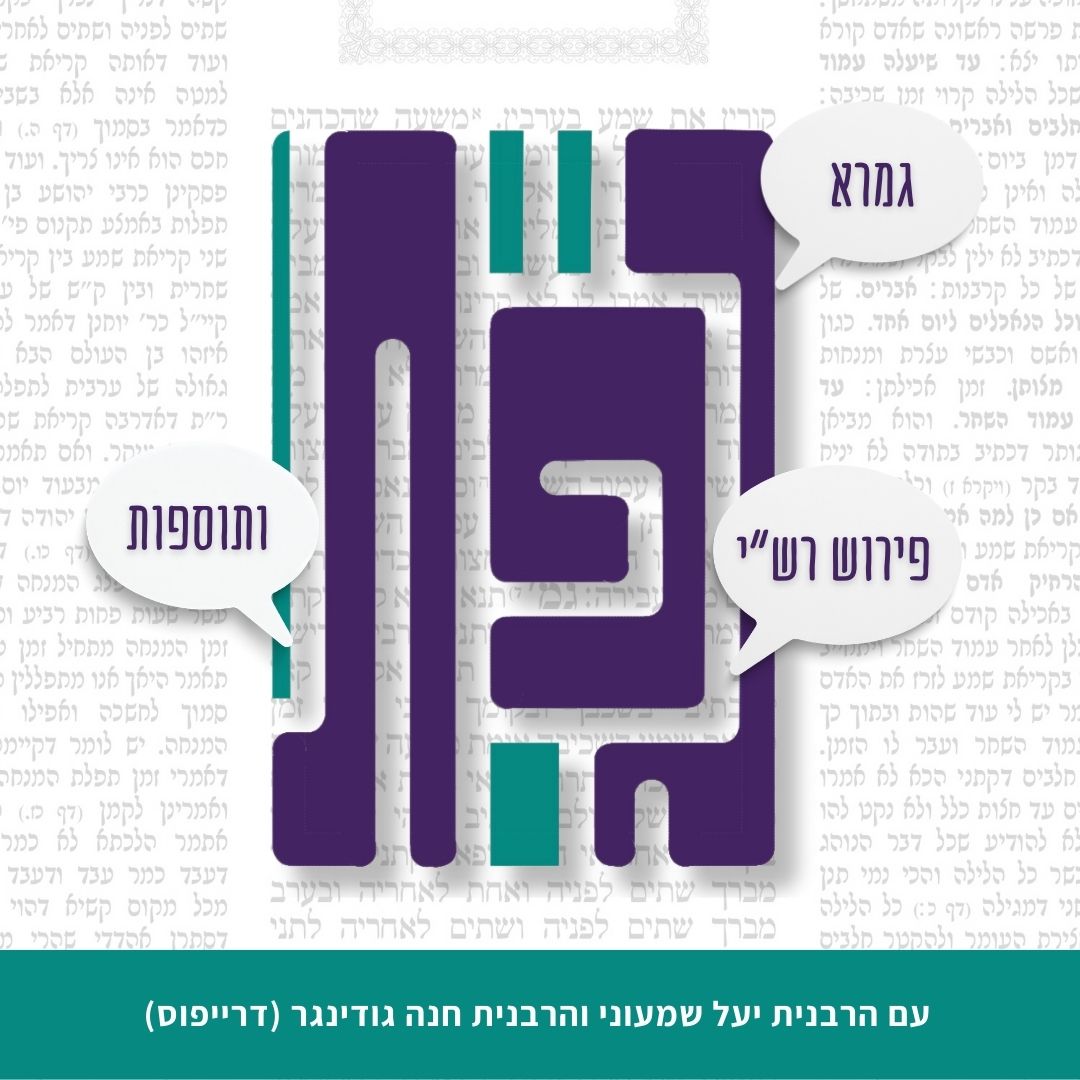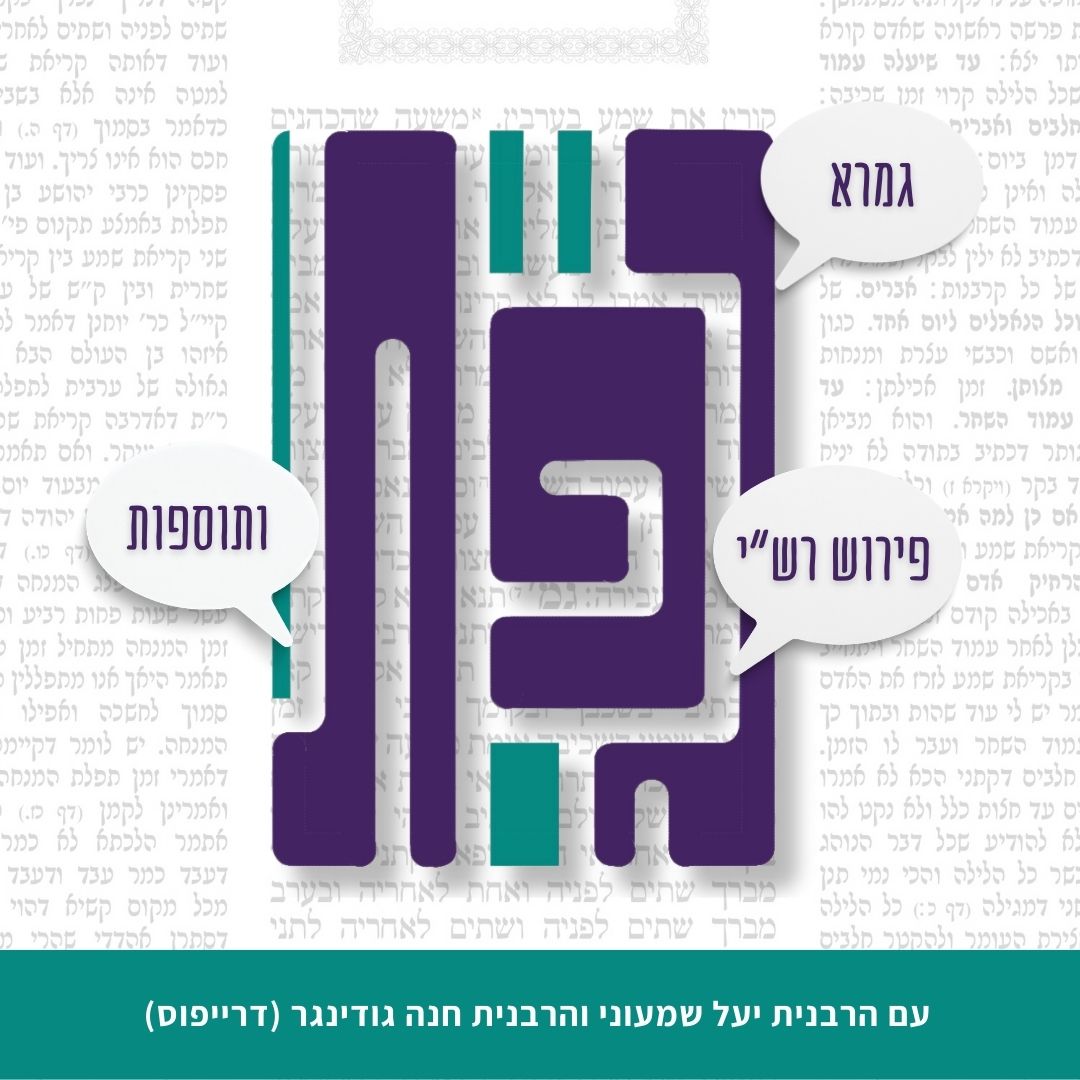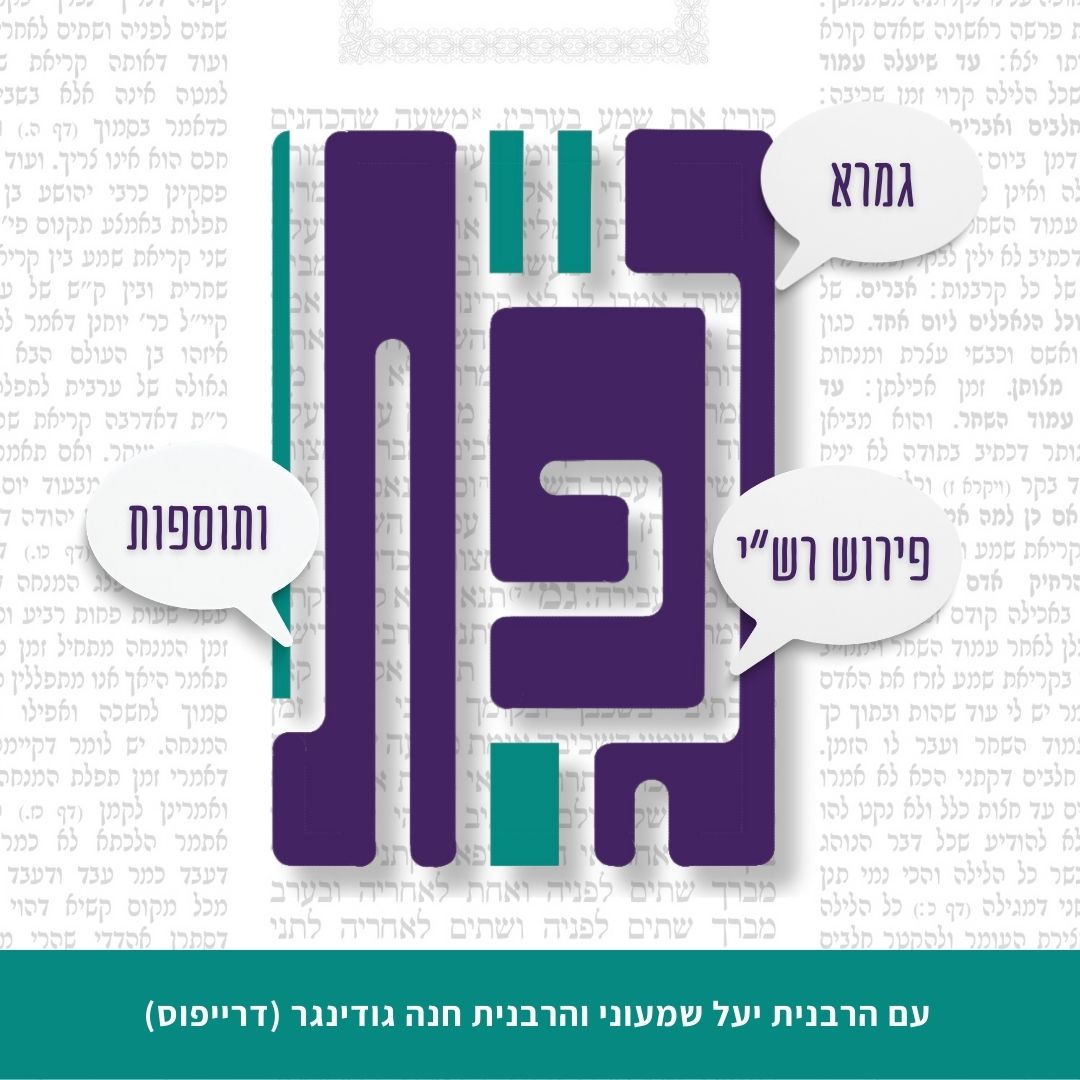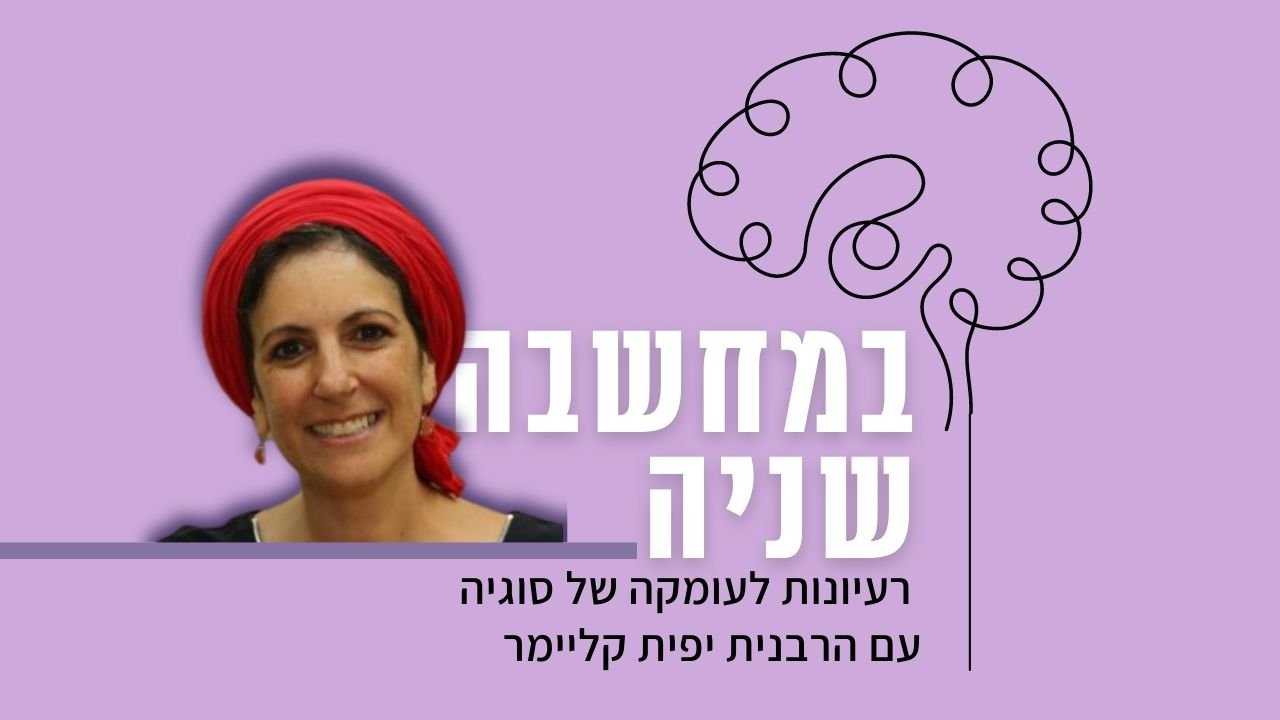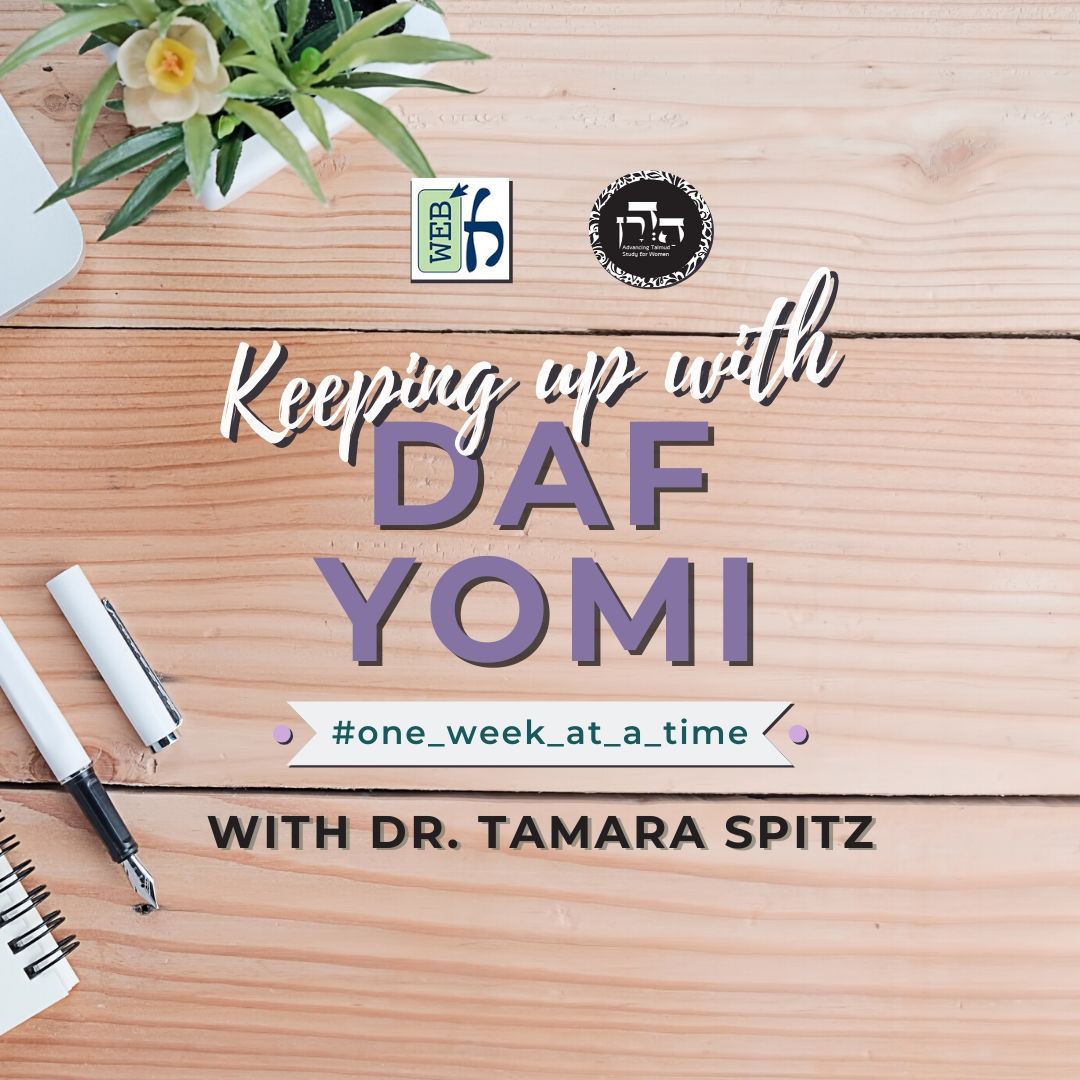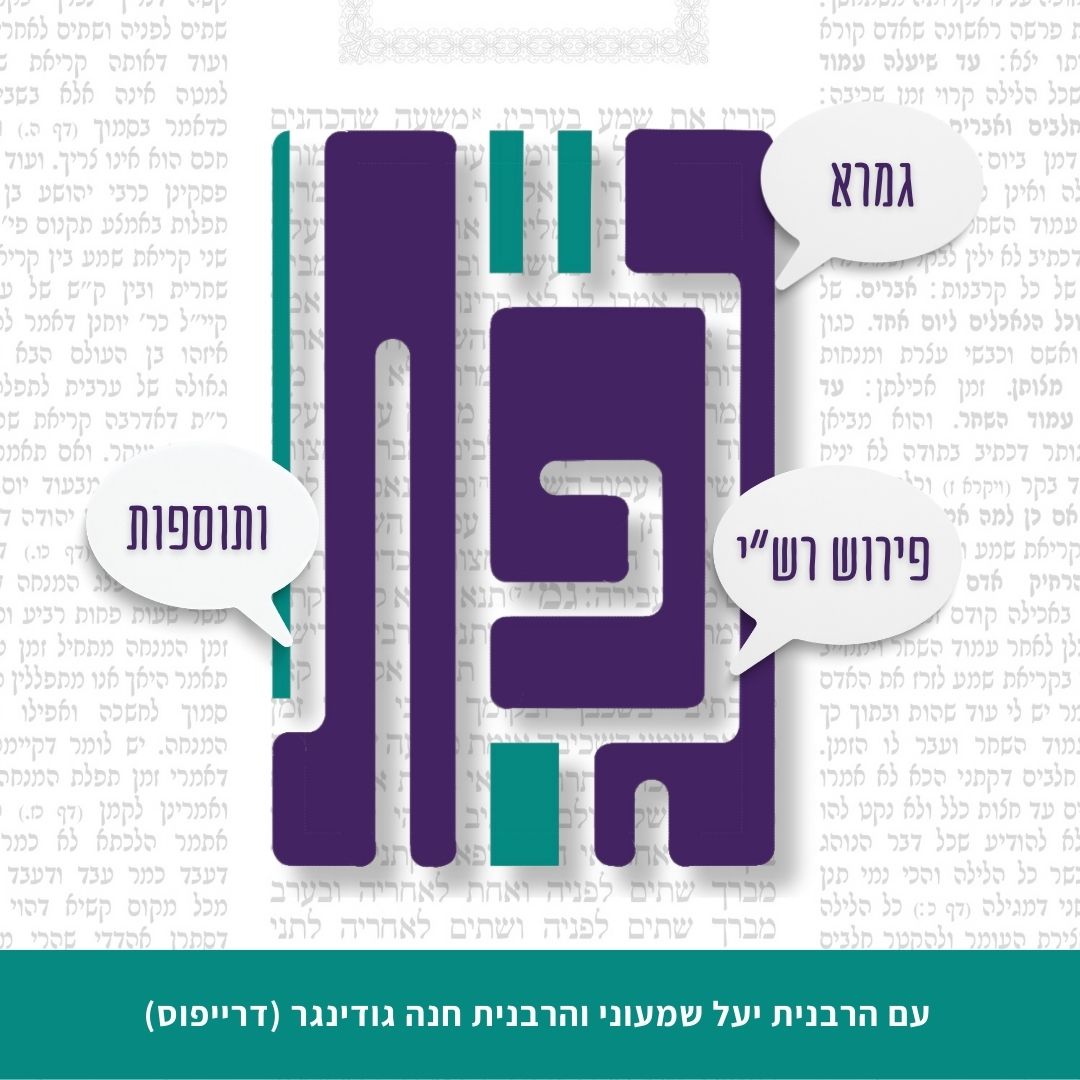המשנה קובעת שבמקרים של הקדש, שומר חנם פטור מלהישבע, בעוד ששומר שכר פטור מאחריות במקרים של גניבה ואבידה. אך יש מקורות תנאיים שנראה כי סותרים משנה זו, מה שמעורר הצעות לפתרון שונות. רבי שמעון מבחין בין קטגוריות שונות של הקדש, וטוען שחלקם כפופים לדיני אונאה. רבי יהודה פוטר פריטים ספציפיים מחוקי אונאה בכלל. הגמרא מבהירה את שתי העמדות האלו. המשנה קובעת שלצד האיסור על אונאה בענייני כספים, קיים גם איסור בתורה נגד אונאה בדברים, התעללות מילולית. מצוטטים דוגמאות שונות כדי להדגיש את חומרת העברה הזו, ומודגשת החומרה שלה.
הלימוד השבוע מוקדש לזכות ולשלום הַיְימׇנוֹט אֱמוּנָה בַּת באנצ’י (קָסָאוּ) בת 11 שנעלמה במקום מגוריה בצפת, לפני שנתיים, ביום ט”ז אדר תשפ”ד (25.2.24), ולא נודעו עקבותיה.
הלימוד השבוע מוקדש למען ביטחון המדינה, החיילים והאזרחים, ולמען חירותו של העם האיראני. שנזכה בקרוב שיתקיים בנו הפסוק: "לַיְּהוּדִים הָיְתָה אוֹרָה וְשִׂמְחָה וְשָׂשֹׂן וִיקָר”.
הלימוד השבוע מוקדש לזכות וְלִשְׁלוֹם הָיימָנוֹט אֱמוּנָה בַּת באנצ’י (קָסָאוּ), בת 11 שנעלמה במקום מגוריה בצפת, לפני שנתיים, ביום ט”ז אדר תשפ״ד (25.2.24), ולא נודעו עקבותיה. אנו מתפללים שֶׁתִּמָּצֵא וְתוּשַׁב לביתה במהרה!
רוצה להקדיש שיעור?
כלים
הלימוד השבוע מוקדש לזכות ולשלום הַיְימׇנוֹט אֱמוּנָה בַּת באנצ’י (קָסָאוּ) בת 11 שנעלמה במקום מגוריה בצפת, לפני שנתיים, ביום ט”ז אדר תשפ”ד (25.2.24), ולא נודעו עקבותיה.
הלימוד השבוע מוקדש למען ביטחון המדינה, החיילים והאזרחים, ולמען חירותו של העם האיראני. שנזכה בקרוב שיתקיים בנו הפסוק: "לַיְּהוּדִים הָיְתָה אוֹרָה וְשִׂמְחָה וְשָׂשֹׂן וִיקָר”.
הלימוד השבוע מוקדש לזכות וְלִשְׁלוֹם הָיימָנוֹט אֱמוּנָה בַּת באנצ’י (קָסָאוּ), בת 11 שנעלמה במקום מגוריה בצפת, לפני שנתיים, ביום ט”ז אדר תשפ״ד (25.2.24), ולא נודעו עקבותיה. אנו מתפללים שֶׁתִּמָּצֵא וְתוּשַׁב לביתה במהרה!
כלים
העמקה
רוצה להבין מה באמת קורה מתחת לפני השטח של הסוגיה?
שיעורים, פודקאסטים והרחבות של מיטב המורות שלנו יפתחו לך עוד זוויות וכיווני חשיבה.
חדשה בלימוד הגמרא?
זה הדף הראשון שלך? איזו התרגשות עצומה! יש לנו בדיוק את התכנים והכלים שיעזרו לך לעשות את הצעדים הראשונים ללמידה בקצב וברמה שלך, כך תוכלי להרגיש בנוח גם בתוך הסוגיות המורכבות ומאתגרות.
פסיפס הלומדות שלנו
גלי את קהילת הלומדות שלנו, מגוון נשים, רקעים וסיפורים. כולן חלק מתנועה ומסע מרגש ועוצמתי.
בבא מציעא נח
נִשְׁבָּעִין לַגִּזְבָּרִין, וְאִם לָאו – נִשְׁבָּעִין לִבְנֵי הָעִיר, וּבְנֵי הָעִיר שׁוֹקְלִין אֲחֵרִים תַּחְתֵּיהֶן. נִמְצְאוּ, אוֹ שֶׁהֶחְזִירוּם הַגַּנָּבִים – אֵלּוּ וְאֵלּוּ שְׁקָלִים הֵם, וְאֵין עוֹלִין לָהֶם לַשָּׁנָה הַבָּאָה.
the agents must take the oath of a bailee to the treasurers that they did not misappropriate the coins. If the collection of the chamber was not yet performed, the lost or stolen shekels remain the property of the residents of the city. Therefore, the agents take an oath to the residents of the city. The residents of the city then contribute other shekels in place of the original shekels. If the original shekels were then found or the thieves returned them, both these, the original shekels, and those, the replacement shekels, assume the status of consecrated shekels and belong to the Temple. But the two half-shekels that they contributed this year do not count to absolve them from their obligation to contribute the shekels for the following year. This mishna teaches that an unpaid bailee does take an oath concerning consecrated property, contrary to the mishna here.
אָמַר שְׁמוּאֵל: הָכָא בְּנוֹשֵׂא שָׂכָר עָסְקִינַן, וְנִשְׁבָּעִין לִיטּוֹל שְׂכָרָן. אִי הָכִי, נִשְׁבָּעִין לַגִּזְבָּרִין? לִבְנֵי הָעִיר מִבְּעֵי לֵיהּ! אָמַר רַבָּה: נִשְׁבָּעִין לִבְנֵי הָעִיר בְּמַעֲמַד גִּזְבָּרִין, כִּי הֵיכִי דְּלָא נִחְשְׁדִינְהוּ, וְאִי נָמֵי, כִּי הֵיכִי דְּלָא לִקְרוֹ לְהוּ ״פּוֹשְׁעִים״.
Shmuel said: Here we are dealing with paid bailees, and the purpose of the oath is not to exempt them from their liability to pay for the theft. Rather, they take an oath that they performed their task properly, in order to collect their wages. The Gemara asks: If so, is this phrase accurate: They take an oath to the treasurers? The tanna should have taught: They take an oath to the residents of the city, from whom they are claiming their wages. Rabba said: They take an oath to the residents of the city in the presence of the treasurers, so that the treasurers will not suspect that the residents of the city did not contribute their shekels at all. Alternatively, the agents take an oath that they executed their mission properly, so that the Temple treasurers will not call them negligent.
וְהָא נִגְנְבוּ אוֹ שֶׁאָבְדוּ קָתָנֵי, וְשׁוֹמֵר שָׂכָר בִּגְנֵיבָה וַאֲבֵידָה חַיּוֹבֵי מִיחַיַּיב! וְהָכָא נָמֵי, נְהִי דְּשַׁלּוֹמֵי לָא מְשַׁלְּמִי, אַגְרַיְיהוּ מִיהָא לַפְסֵיד.
The Gemara asks: But isn’t it taught in the mishna: And the coins were stolen or were lost en route, and paid bailees are liable to pay in cases of theft and loss? And here too, when safeguarding consecrated property, although paid bailees do not pay for the theft, as a paid bailee is exempt, let them at least forfeit their wages, as their responsibility to safeguard the money includes preventing theft and loss.
אָמַר רַבָּה: נִגְנְבוּ – בְּלִסְטִים מְזוּיָּין, אָבְדוּ – שֶׁטָּבְעָה סְפִינָתוֹ בַּיָּם.
Rabba said: When the tanna says that they were stolen, the reference is to a case where the item was stolen by armed bandits. When he said that they were lost, the reference is to a case where the agent’s ship sank at sea. Since the shekels left his possession through circumstances beyond his control, this is considered an unavoidable accident, for which a paid bailee is exempt.
רַבִּי יוֹחָנָן אָמַר: הָא מַנִּי? רַבִּי שִׁמְעוֹן הִיא, דְּאָמַר: קָדָשִׁים שֶׁחַיָּיב בְּאַחְרָיוּתָן – יֵשׁ לָהֶן אוֹנָאָה, וְנִשְׁבָּעִין עֲלֵיהֶם.
Rabbi Yoḥanan said: In accordance with whose opinion is this mishna? It is in accordance with the opinion of Rabbi Shimon, who says: Consecrated items for which one bears responsibility to replace them are subject to the halakhot of exploitation, and therefore one takes an oath concerning them.
הָתִינַח עַד שֶׁלֹּא נִתְרְמָה הַתְּרוּמָה. מִשֶּׁנִּתְרְמָה הַתְּרוּמָה, קָדָשִׁים שֶׁאֵינוֹ חַיָּיב בְּאַחְרָיוּתָן נִינְהוּ, דְּתַנְיָא: תּוֹרְמִין עַל הָאָבוּד, וְעַל הַגָּבוּי, וְעַל הֶעָתִיד לִגָּבוֹת.
The Gemara asks: This works out well if the contribution of the chamber had not yet been collected into the baskets. At that stage, residents of the city bear responsibility to replace the shekels, and that is why Rabbi Shimon deems the agent liable to take an oath. But if the shekels were lost or stolen once the contribution of the chamber had been collected, the shekels are tantamount to sacrificial animals for which one does not bear responsibility, and the residents of the city should be exempt, as it is taught in a baraita: One collects shekels in the Temple chamber with the intention of fulfilling the obligation for those coins that are lost on the way, and for those that are collected but did not yet arrive, and for those that are destined to be collected in the future. Apparently, the residents of the city no longer bear responsibility for the shekels.
אֶלָּא אָמַר רַבִּי אֶלְעָזָר: שְׁבוּעָה זוֹ תַּקָּנַת חֲכָמִים הִיא, שֶׁלֹּא יְהוּ בְּנֵי אָדָם מְזַלְזְלִים בַּהֶקְדֵּשׁוֹת.
The Gemara concludes: Rather, Rabbi Elazar said: This oath of the agents is a rabbinic ordinance, instituted so that people will not treat consecrated property with contempt. If they knew that there is no oath, they would neglect to safeguard the shekels properly.
נוֹשֵׂא שָׂכָר אֵינוֹ מְשַׁלֵּם. רָמֵי לֵיהּ רַב יוֹסֵף בַּר חָמָא לְרַבָּה: תְּנַן, נוֹשֵׂא שָׂכָר אֵינוֹ מְשַׁלֵּם, וּרְמִינְהוּ: הַשּׂוֹכֵר אֶת הַפּוֹעֵל לִשְׁמוֹר אֶת הַפָּרָה, לִשְׁמוֹר אֶת הַתִּינוֹק, לִשְׁמוֹר אֶת הַזְּרָעִים – אֵין נוֹתְנִים לוֹ שְׂכַר שַׁבָּת, לְפִיכָךְ אֵין אַחְרָיוּת שַׁבָּת עָלָיו.
§ The mishna teaches: A paid bailee does not pay if these items were stolen or lost. Rav Yosef bar Ḥama raises a contradiction before Rabba. We learned in the mishna: A paid bailee does not pay. And the Gemara raises a contradiction from a baraita: One who hires a day laborer to watch the red heifer to ensure that it is not disqualified, to watch the child to ensure that he remains ritually pure from birth in order to draw the water mixed with the ashes of the heifer, or to safeguard the seeds for the barley that will be used in the omer offering, does not give him wages for Shabbat. Therefore, if the items that the day laborer was entrusted to watch were lost on Shabbat, financial responsibility for their loss on Shabbat is not incumbent upon him, since he is not a paid bailee on that day.
הָיָה שְׂכִיר שַׁבָּת, שְׂכִיר חֹדֶשׁ, שְׂכִיר שָׁנָה, שְׂכִיר שָׁבוּעַ – נוֹתְנִין לוֹ שְׂכַר שַׁבָּת, לְפִיכָךְ אַחְרָיוּת שַׁבָּת עָלָיו. מַאי לָאו לְשַׁלֵּם?
The baraita continues: But if he was a laborer hired for a week, hired for a month, hired for a year, or hired for seven years, the one who hired him gives him wages for labor performed on Shabbat as well. Therefore, if the items were lost on Shabbat, financial responsibility for their loss on Shabbat is incumbent upon him. What, is it not that he is liable to pay for the loss he caused? As the list of the items being safeguarded includes consecrated items, this baraita apparently rules that a paid bailee bears responsibility for consecrated property.
לָא, לְהַפְסִיד שְׂכָרוֹ. אִי הָכִי, רֵישָׁא דְּקָתָנֵי: ״אֵין אַחְרָיוּת שַׁבָּת עָלָיו״ – הָכִי נָמֵי דִּלְהַפְסִיד שְׂכָרוֹ? וּמִי אִית לֵיהּ שְׂכַר שַׁבָּת? וְהָא קָתָנֵי: ״אֵין נוֹתְנִין לוֹ שְׂכַר שַׁבָּת״! אִשְׁתִּיק.
The Gemara rejects this: No, the ruling of the baraita stating that the bailee is responsible is only with regard to forfeiting his wages because he was derelict in safeguarding the items with which he was entrusted. Rav Yosef bar Ḥama asks: If so, in the first clause of the baraita, which teaches that financial responsibility for their loss on Shabbat is not incumbent upon him, is this also with regard to forfeiting his wages? But does he have wages for the work he did on Shabbat? But isn’t it taught that one does not give him wages for Shabbat? Clearly, the reference is to responsibility to pay for the safeguarded items themselves. Rabba was silent, unable to answer.
אֲמַר לֵיהּ: מִידֵּי שְׁמִיעַ לָךְ בְּהָא? אֲמַר לֵיהּ: הָכִי אָמַר רַב שֵׁשֶׁת, בְּשֶׁקָּנוּ מִיָּדוֹ. וְכֵן אָמַר רַבִּי יוֹחָנָן, בְּשֶׁקָּנוּ מִיָּדוֹ.
Rabba said to Rav Yosef bar Ḥama: Have you heard anything with regard to this? Rav Yosef bar Ḥama said to him that this is what Rav Sheshet says: The ruling of the latter clause is stated with regard to a case where the laborers made a commitment to the one who hired them to take responsibility for the items, and they performed an act of acquisition with the one who hired them to reinforce that commitment. And likewise Rabbi Yoḥanan says: The ruling of the latter clause is stated with regard to a case where the laborers made a commitment to the one who hired them to take responsibility for the items, and they performed an act of acquisition with him.
רַבִּי שִׁמְעוֹן אוֹמֵר: קָדָשִׁים שֶׁחַיָּיב בְּאַחְרָיוּתָן – יֵשׁ לָהֶן אוֹנָאָה. וְשֶׁאֵינוֹ חַיָּיב בְּאַחְרָיוּתָן – אֵין לָהֶן אוֹנָאָה. תָּנֵי תַּנָּא קַמֵּיהּ דְּרַבִּי יִצְחָק בַּר אַבָּא:
§ The mishna teaches that Rabbi Shimon says: Sacrificial animals for which one bears responsibility to replace them are subject to the halakhot of exploitation, and those for which one does not bear responsibility to replace them are not subject to the halakhot of exploitation. The Gemara relates that the tanna who recited mishnayot and baraitot in the study hall taught a baraita before Rabbi Yitzḥak bar Abba with regard to the source of the opinion of Rabbi Shimon. It is derived from the verse: “If anyone sins, and commits a trespass against the Lord, and deals falsely with his colleague in a matter of deposit, or of pledge, or of robbery, or has oppressed his neighbor” (Leviticus 5:21).
קָדָשִׁים שֶׁחַיָּיב בְּאַחְרָיוּתָן, חַיָּיב, שֶׁאֲנִי קוֹרֵא בָּהֶן: ״בַּה׳ וְכִחֵשׁ״. וְשֶׁאֵינוֹ חַיָּיב בְּאַחְרָיוּתָן, פָּטוּר, שֶׁאֲנִי קוֹרֵא בָּהֶן: ״בַּעֲמִיתוֹ וְכִחֵשׁ״.
In that baraita, it is taught: For an oath concerning sacrificial animals for which one bears responsibility, one is liable to bring an offering for taking a false oath, as I apply the phrase “against the Lord, and deals falsely.” And for an oath concerning sacrificial animals for which one does not bear responsibility, one is exempt, as I read in their regard: With his neighbor, and deals falsely. That reading indicates that even one who deals falsely in matters related to the Lord, e.g., sacrificial animals, is liable to bring an offering for a false oath.
אֲמַר לֵיהּ: כְּלַפֵּי לְיָיא?!
Rabbi Yitzḥak said to him: Isn’t it the opposite [kelapei layya]?
אִיפְּכָא מִסְתַּבְּרָא! אֲמַר לֵיהּ: אֶיסְמְיַהּ?
The opposite is reasonable. An oath concerning sacrificial animals for which one does not bear responsibility is considered to be a matter related to the Lord even more than an oath concerning a sacrificial animal for which one bears responsibility, as in the latter case it is owned by the person in some respects. The tanna said to him: Should I delete this baraita because it is corrupted?
אֲמַר לֵיהּ: לָא. הָכִי קָאָמַר: קָדָשִׁים שֶׁחַיָּיב בְּאַחְרָיוּתָן – חַיָּיב, דְּאִיתְרַבּוּ מִ״בַּה׳ וְכִחֵשׁ״. וְשֶׁאֵינוֹ חַיָּיב בְּאַחְרָיוּתָן – פָּטוּר, דְּאִמְּעִיט מִ״בַּעֲמִיתוֹ וְכִחֵשׁ״.
Rabbi Yitzḥak bar Abba said to him: No, this is what the baraita is saying: For an oath taken concerning sacrificial animals for which one bears responsibility, one is liable to bring an offering for a false oath, as it is included due to the phrase “against the Lord, and deals falsely.” It is derived from this that one is liable for taking a false oath even with regard to an item which belongs, to a certain degree, to the Lord. And with regard to sacrificial animals for which one does not bear responsibility, one is exempt, as it is excluded by the phrase: With his neighbor and deals falsely. It is derived from this that one is liable to bring an offering for a false oath only if it pertained to property that belongs to a layman, i.e., his neighbor, but not for an item that belongs completely to God, as is the case with regard to sacrificial animals for which one does not bear responsibility.
רַבִּי יְהוּדָה אוֹמֵר: אַף הַמּוֹכֵר סֵפֶר תּוֹרָה, מַרְגָּלִית וּבְהֵמָה, אֵין לָהֶם אוֹנָאָה. תַּנְיָא, רַבִּי יְהוּדָה אוֹמֵר: אַף הַמּוֹכֵר סֵפֶר תּוֹרָה, אֵין לָהּ אוֹנָאָה – לְפִי שֶׁאֵין קֵץ לְדָמֶיהָ. בְּהֵמָה וּמַרְגָּלִית, אֵין לָהֶם אוֹנָאָה – מִפְּנֵי שֶׁאָדָם רוֹצֶה לְזַוְּוגָן.
§ The mishna teaches: Rabbi Yehuda says: Even in the case of one who sells a Torah scroll, a pearl, or an animal, those items are not subject to the halakhot of exploitation. It is taught in a baraita that Rabbi Yehuda says: Even in the case of one who sells a Torah scroll, it is not subject to the halakhot of exploitation, as there is no limit to its value. It is the Torah of God, which is priceless. An animal and a pearl are not subject to the halakhot of exploitation because a person seeks to pair them. An animal is paired with an animal of similar strength so that they can be yoked together to work in the field. A pearl is paired with a similar pearl to fashion jewelry. Since there is a need to obtain a specific variant of these items, one is not particular about the price.
אָמְרוּ לוֹ: וַהֲלֹא הַכֹּל אָדָם רוֹצֶה לְזַוְּוגָן? וְרַבִּי יְהוּדָה, הָנֵי חֲשִׁיבִי לֵיהּ, וְהָנֵי לָא חֲשִׁיבִי לֵיהּ. וְעַד כַּמָּה? אָמַר אַמֵּימָר: עַד כְּדֵי דְּמֵיהֶם.
The baraita continues: The Rabbis said to him: But isn’t it the case that with regard to every item, a person seeks to pair them with similar items under certain circumstances? According to your explanation, the halakhot of exploitation would never apply. The Gemara asks: And what does Rabbi Yehuda respond to that question? He claims that these are significant to a person, but those are not significant to him. In other words, it is particularly important to find a precise match for an animal and a pearl. The Gemara continues to analyze Rabbi Yehuda’s opinion. And up to how much can one deviate from the value of items for which exploitation does not apply, as Rabbi Yehuda is clearly not saying that any deviation is acceptable? Ameimar said: One can deviate up to double their value.
תַּנְיָא, רַבִּי יְהוּדָה בֶּן בְּתֵירָא אוֹמֵר: אַף הַמּוֹכֵר סוּס וְסַיִיף וַחֲטִיטוֹם בַּמִּלְחָמָה – אֵין לָהֶם אוֹנָאָה, מִפְּנֵי שֶׁיֵּשׁ בָּהֶן חַיֵּי נֶפֶשׁ.
It is taught in a baraita that Rabbi Yehuda ben Beteira says: Even in the case one who sells a horse, or a sword, or a helmet [veḥatitom] during wartime, these items are not subject to the halakhot of exploitation, because they then have the capacity to preserve life, and a person is willing to pay any price for them.
מַתְנִי׳ כְּשֵׁם שֶׁאוֹנָאָה בְּמִקָּח וּמִמְכָּר, כָּךְ אוֹנָאָה בִּדְבָרִים. לֹא יֹאמַר לוֹ: בְּכַמָּה חֵפֶץ זֶה? וְהוּא אֵינוֹ רוֹצֶה לִיקַּח. אִם הָיָה בַּעַל תְּשׁוּבָה, לֹא יֹאמַר לוֹ: זְכוֹר מַעֲשֶׂיךָ הָרִאשׁוֹנִים. אִם הוּא בֶּן גֵּרִים, לֹא יֹאמַר לוֹ: זְכוֹר מַעֲשֵׂה אֲבוֹתֶיךָ, שֶׁנֶּאֱמַר: ״וְגֵר לֹא תוֹנֶה וְלֹא תִלְחָצֶנּוּ״.
MISHNA: Just as there is a prohibition against exploitation [ona’a] in buying and selling, so is there ona’a in statements, i.e., verbal mistreatment. The mishna proceeds to cite examples of verbal mistreatment. One may not say to a seller: For how much are you selling this item, if he does not wish to purchase it. He thereby upsets the seller when the deal fails to materialize. The mishna lists other examples: If one is a penitent, another may not say to him: Remember your earlier deeds. If one is the child of converts, another may not say to him: Remember the deeds of your ancestors, as it is stated: “And a convert shall you neither mistreat, nor shall you oppress him” (Exodus 22:20).
גְּמָ׳ תָּנוּ רַבָּנַן: ״לֹא תוֹנוּ אִישׁ אֶת עֲמִיתוֹ״ – בְּאוֹנָאַת דְּבָרִים הַכָּתוּב מְדַבֵּר. אַתָּה אוֹמֵר בְּאוֹנָאַת דְּבָרִים, אוֹ אֵינוֹ אֶלָּא בְּאוֹנָאַת מָמוֹן? כְּשֶׁהוּא אוֹמֵר ״וְכִי תִמְכְּרוּ מִמְכָּר לַעֲמִיתֶךָ אוֹ קָנֹה מִיַּד עֲמִיתֶךָ״, הֲרֵי אוֹנָאַת מָמוֹן אָמוּר! הָא מָה אֲנִי מְקַיֵּים ״לֹא תוֹנוּ אִישׁ אֶת עֲמִיתוֹ״? בְּאוֹנָאַת דְּבָרִים.
GEMARA: The Sages taught: It is written: “And you shall not mistreat [tonu] one man his colleague; and you shall fear your God, for I am the Lord your God” (Leviticus 25:17). The tanna explains: The verse is speaking with regard to verbal mistreatment. The baraita proceeds: Do you say that it is speaking of verbal mistreatment [be’ona’at devarim], or perhaps it is speaking only with regard to monetary exploitation [be’ona’at mammon]? When it says in a previous verse: “And if you sell to your colleague an item that is sold, or acquire from your colleague’s hand, you shall not exploit [tonu] his brother” (Leviticus 25:14), monetary exploitation is explicitly stated. How then do I realize the meaning of the verse: “And you shall not mistreat one man his colleague”? It is with regard to verbal mistreatment.
הָא כֵּיצַד? אִם הָיָה בַּעַל תְּשׁוּבָה, אַל יֹאמַר לוֹ: ״זְכוֹר מַעֲשֶׂיךָ הָרִאשׁוֹנִים״. אִם הָיָה בֶּן גֵּרִים, אַל יֹאמַר לוֹ: ״זְכוֹר מַעֲשֵׂה אֲבוֹתֶיךָ״. אִם הָיָה גֵּר וּבָא לִלְמוֹד תּוֹרָה, אַל יֹאמַר לוֹ: ״פֶּה שֶׁאָכַל נְבֵילוֹת וּטְרֵיפוֹת, שְׁקָצִים וּרְמָשִׂים, בָּא לִלְמוֹד תּוֹרָה שֶׁנֶּאֶמְרָה מִפִּי הַגְּבוּרָה״?
How so? If one is a penitent, another may not say to him: Remember your earlier deeds. If one is the child of converts, another may not say to him: Remember the deed of your ancestors. If one is a convert and he came to study Torah, one may not say to him: Does the mouth that ate unslaughtered carcasses and animals that had wounds that would have caused them to die within twelve months [tereifot], and repugnant creatures, and creeping animals, comes to study Torah that was stated from the mouth of the Almighty?
אִם הָיוּ יִסּוּרִין בָּאִין עָלָיו, אִם הָיוּ חֳלָאִים בָּאִין עָלָיו, אוֹ שֶׁהָיָה מְקַבֵּר אֶת בָּנָיו, אַל יֹאמַר לוֹ כְּדֶרֶךְ שֶׁאָמְרוּ לוֹ חֲבֵירָיו לְאִיּוֹב: ״הֲלֹא יִרְאָתְךָ כִּסְלָתֶךָ תִּקְוָתְךָ וְתֹם דְּרָכֶיךָ. זְכׇר נָא מִי הוּא נָקִי אָבָד״.
If torments are afflicting a person, if illnesses are afflicting him, or if he is burying his children, one may not speak to him in the manner that the friends of Job spoke to him: “Is not your fear of God your confidence, and your hope the integrity of your ways? Remember, I beseech you, whoever perished, being innocent?” (Job 4:6–7). Certainly you sinned, as otherwise you would not have suffered misfortune.
אִם הָיוּ חַמָּרִים מְבַקְּשִׁין תְּבוּאָה מִמֶּנּוּ, לֹא יֹאמַר לָהֶם: ״לְכוּ אֵצֶל פְּלוֹנִי שֶׁהוּא מוֹכֵר תְּבוּאָה״, וְיוֹדֵעַ בּוֹ שֶׁלֹּא מָכַר מֵעוֹלָם. רַבִּי יְהוּדָה אוֹמֵר: אַף לֹא יִתְלֶה עֵינָיו עַל הַמִּקָּח, בְּשָׁעָה שֶׁאֵין לוֹ דָּמִים, שֶׁהֲרֵי הַדָּבָר מָסוּר לַלֵּב, וְכׇל דָּבָר הַמָּסוּר לַלֵּב נֶאֱמַר בּוֹ ״וְיָרֵאתָ מֵאֱלֹהֶיךָ״.
Likewise, if donkey drivers are asking to purchase grain from someone, and he has none, he may not say to them: Go to so-and-so, as he sells grain, if he knows about him that he never sold grain at all. He thereby causes the donkey drivers and the would-be seller anguish. Rabbi Yehuda says: One may not even cast his eyes on the merchandise for sale, creating the impression that he is interested, at a time when he does not have money to purchase it. Verbal mistreatment is not typically obvious, and it is difficult to ascertain the intent of the offender, as the matter is given to the heart of each individual, as only he knows what his intention was when he spoke. And with regard to any matter given to the heart, it is stated: “And you shall fear your God” (Leviticus 25:17), as God is privy to the intent of the heart.
אָמַר רַבִּי יוֹחָנָן מִשּׁוּם רַבִּי שִׁמְעוֹן בֶּן יוֹחַאי: גָּדוֹל אוֹנָאַת דְּבָרִים מֵאוֹנָאַת מָמוֹן, שֶׁזֶּה נֶאֱמַר בּוֹ ״וְיָרֵאתָ מֵאֱלֹהֶיךָ״, וְזֶה לֹא נֶאֱמַר בּוֹ ״וְיָרֵאתָ מֵאֱלֹהֶיךָ״. וְרַבִּי אֶלְעָזָר אוֹמֵר: זֶה בְּגוּפוֹ וְזֶה בְּמָמוֹנוֹ. רַבִּי שְׁמוּאֵל בַּר נַחְמָנִי אָמַר: זֶה נִיתַּן לְהִישָּׁבוֹן, וְזֶה לֹא נִיתַּן לְהִישָּׁבוֹן.
Rabbi Yoḥanan says in the name of Rabbi Shimon ben Yoḥai: Greater is the transgression of verbal mistreatment than the transgression of monetary exploitation, as with regard to this, verbal mistreatment, it is stated: “And you shall fear your God.” But with regard to that, monetary exploitation, it is not stated: “And you shall fear your God.” And Rabbi Elazar said this explanation: This, verbal mistreatment, affects one’s body; but that, monetary exploitation, affects one’s money. Rabbi Shmuel bar Naḥmani says: This, monetary exploitation, is given to restitution; but that, verbal mistreatment, is not given to restitution.
תָּנֵי תַּנָּא קַמֵּיהּ דְּרַב נַחְמָן בַּר יִצְחָק: כׇּל הַמַּלְבִּין פְּנֵי חֲבֵירוֹ בָּרַבִּים, כְּאִילּוּ שׁוֹפֵךְ דָּמִים. אֲמַר לֵיהּ: שַׁפִּיר קָא אָמְרַתְּ, דְּחָזֵינָא לֵיהּ דְּאָזֵיל סוּמָּקָא וְאָתֵי חִוּוֹרָא. אֲמַר לֵיהּ אַבָּיֵי לְרַב דִּימִי: בְּמַעְרְבָא בְּמַאי זְהִירִי? אֲמַר לֵיהּ: בְּאַחְווֹרֵי אַפֵּי, דְּאָמַר רַבִּי חֲנִינָא: הַכֹּל יוֹרְדִין לְגֵיהִנָּם, חוּץ מִשְּׁלֹשָׁה.
The Gemara relates that the tanna who recited mishnayot and baraitot in the study hall taught a baraita before Rav Naḥman bar Yitzḥak: Anyone who humiliates another in public, it is as though he were spilling blood. Rav Naḥman bar Yitzḥak said to him: You have spoken well, as we see that after the humiliated person blushes, the red leaves his face and pallor comes in its place, which is tantamount to spilling his blood. Abaye said to Rav Dimi: In the West, i.e., Eretz Yisrael, with regard to what mitzva are they particularly vigilant? Rav Dimi said to him: They are vigilant in refraining from humiliating others, as Rabbi Ḥanina says: Everyone descends to Gehenna except for three.
הַכֹּל סָלְקָא דַּעְתָּךְ? אֶלָּא אֵימָא: כָּל הַיּוֹרְדִין לְגֵיהִנָּם עוֹלִים, חוּץ מִשְּׁלֹשָׁה שֶׁיּוֹרְדִין וְאֵין עוֹלִין. וְאֵלּוּ הֵן: הַבָּא עַל אֵשֶׁת אִישׁ, וְהַמַּלְבִּין פְּנֵי חֲבֵירוֹ בָּרַבִּים, וְהַמְכַנֶּה שֵׁם רַע לַחֲבֵירוֹ. מְכַנֶּה הַיְינוּ מַלְבִּין? אַף עַל גַּב דְּדָשׁ בֵּיהּ בִּשְׁמֵיהּ.
The Gemara asks: Does it enter your mind that everyone descends to Gehenna? Rather, say: Anyone who descends to Gehenna ultimately ascends, except for three who descend and do not ascend, and these are they: One who engages in intercourse with a married woman, as this transgression is a serious offense against both God and a person; and one who humiliates another in public; and one who calls another a derogatory name. The Gemara asks with regard to one who calls another a derogatory name: That is identical to one who shames him; why are they listed separately? The Gemara answers: Although the victim grew accustomed to being called that name in place of his name, and he is no longer humiliated by being called that name, since the intent was to insult him, the perpetrator’s punishment is severe.
אָמַר רַבָּה בַּר בַּר חָנָה אָמַר רַבִּי יוֹחָנָן:
Rabba bar bar Ḥana says that Rabbi Yoḥanan says:
